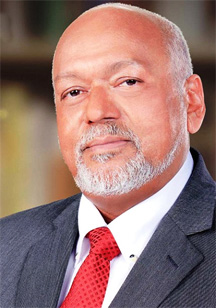-UK publishers still to be approached
President Donald Ramotar yesterday said his administration is trying to resolve the controversy that has erupted over its decision to procure pirated textbooks for public schools in light of concerns by publishers.
“We are looking at that right now. I am hoping to have an amicable solution to that matter, while at the same time we are trying to get value for money and ensure our kids have books and so forth,” Ramotar told a news conference at Office of the President yesterday, while noting that the UK envoy here had had discussions with government officials about the situation.
His comment came a day after Cabinet Secretary Dr Roger Luncheon announced that publishers are being engaged in the light of their concerns over government’s decision. But up to yesterday, Emma House, International and Trade Director, of UK-based The Publishers Association said that there had been no contact from the government but that the publishers were nevertheless open to negotiations.

Five of the six companies that have tendered for the contract to supply schools with the pirated books are local printeries that have been asked in official documentation to produce copies as close as possible to the original books.
The books that pre-selected firms were asked to bid to supply include titles from Oxford University Press, Nelson Thornes, Pearson Education, Hodder Education of the United Kingdom and Royards and Caribbean Educational Publishing of Trinidad & Tobago.
This has not gone down well with regional and international publishers, which have strongly criticised the government. Royards and the The Publishers Association Limited subsequently signalled that legal action is likely over the state’s actions, which has been ongoing for some time. Parliamentary opposition parties, APNU and AFC, have condemned the government’s defence of its decision, saying that it was sending a mixed message on the rule of law.
Ramotar yesterday assured that his administration is actively addressing the matter and to bring the controversies to end, while not affecting children’s education. “We are working on it. Hopefully I will have something to tell you in the not too distant future on that issue,” he said.
The president also confirmed that British High Commissioner to Guyana Andrew Ayre has held talks on the issue with government officials.
“He met with other people in the government. I don’t want to go into details but we are all trying to come to a solution on this issue,” he added. Meanwhile, in a statement to Stabroek News, House said that up to yesterday “British publishers have not been approached by the Guyanese government regarding the provision of books.”
She added, “Publishers are nonetheless ready to discuss with the Guyanese government the importance of respecting copyright; the importance of providing school children with high quality materials and engage in fruitful legal trade negotiations.” Previously, House had said that UK publishers had not been contacted by government to discuss supplying of legitimate books, thereby making the government’s claim that this illegal action is justified by concern over price disingenuous.
House, who runs the association’s anti-piracy campaigns in overseas territories, said that the “indisputably illegal act” decision by Cabinet was in contravention of Guyanese law, the Caricom’s revised Treaty of Chaguaramas, and the International Berne Convention. As a result of the situation, she said the publishers were looking at their legal options to stop the government from buying pirated textbooks for schools.





